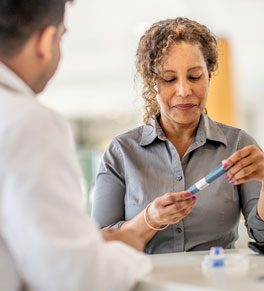
Noninvasive Cardiovascular Imaging
If heart disease runs in your family, your best friend is early detection. We’ll take noninvasive pictures of your heart to diagnose with precision.
A crystal-clear set of heart images can provide a tailored path to early treatment and recovery.
Our approach to noninvasive cardiovascular imaging
At UCI Health, we stay hyper-focused on your patient experience. Our goal is to identify and treat heart disease at its earliest stages, when it’s most treatable. One of our most important tools is clear imaging.
Noninvasive cardiovascular imaging serves three main functions:
It’s a diagnostic tool that reveals your heart’s structure, blood vessels and surrounding anatomy so we can diagnose your condition
If you need an intervention like a valve replacement, we guide the surgeon with imaging tools live during the procedure. This helps with proper positioning or to check for leaks
We also use imaging as an important follow-up tool to make sure an implanted device or treatment is working
How we work together
We work in teams across different disciplines based on your examination, history and test results. For example, if you’re at high risk, a smoker, or have a family history of heart disease, we’ll make certain recommendations.
Our Preventive Cardiology and Cholesterol Management Program works alongside Radiology Services. Together they offer what is called a coronary calcium scan. If you’re at high risk, this test looks for a buildup of arterial plaque and helps us predict heart disease.
Or if you are a candidate for a replacement valve (or another complex treatment), we have a multidisciplinary discussion. Instead of one doctor deciding what you need, our meeting would include:
- a cardiothoracic surgeon
- interventional cardiologist
- cardiac imaging specialist
- primary cardiologist
- and nurse practitioners
We talk with you about lifestyle choices
Prevention is also a powerful medicine. In some cardiac illnesses, lifestyle choices can greatly improve your health and help you avoid worsening symptoms. If your tests show plaque buildup, we’ll discuss what you could do to interrupt this heart disease process.
Why choose UCI Health for noninvasive cardiovascular imaging?
Heart medicine has grown exponentially in the past twenty years and continues to shift and change
In many instances, we’ve replaced invasive surgical procedures with noninvasive practices or powerful medicines. We stay at the leading edge of innovation to keep pace with the changes.
We do innovative research to better understand abnormal heart structures or test new medicines
When you step into UCI Health with a serious heart issue, you may qualify for one of our clinical trials. This means that in addition to receiving gold standard treatment, you may get experimental drugs or tools not available elsewhere.
We teach the next generation of cardiologists
We believe in what we do. Our faculty makes sure the next group of physicians are thoughtful, collaborative and excellent practitioners.
In cardiology, our goal is to see new patients quickly
If you’re a new patient and require heart imaging, we do our best to see you within three working days.
Looking for more options?
View all clinicians
Be proactive with your heart health
In the Noninvasive Cardiovascular Imaging Program, we’re here to help you with early detection. Our tests are noninvasive and relatively quick.
Call 714-456-6699 now to make an imaging appointment.

Find a cardiology clinical trial
Talk to your doctor to see if a cardiology clinical trial is right for you.
Featured Blog Posts

Are menopause test kits worthwhile?

Sweet and healthy holiday treats





